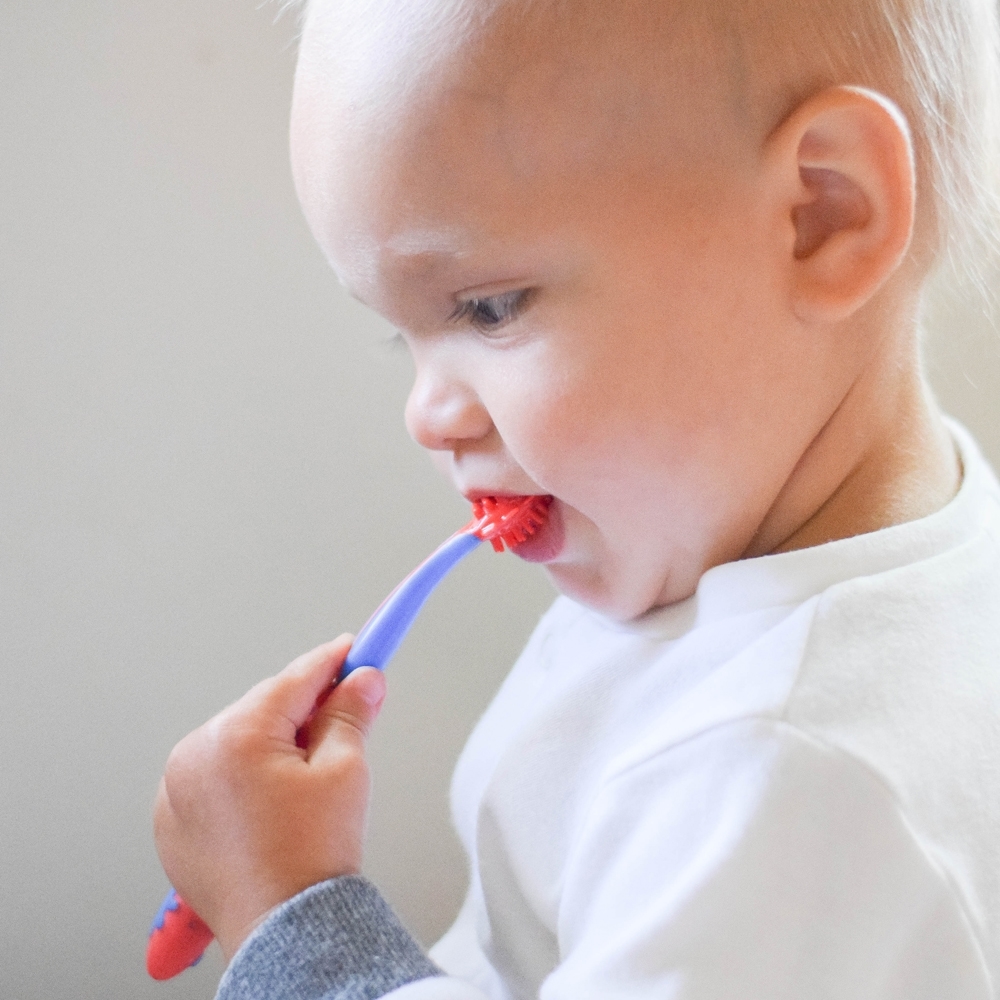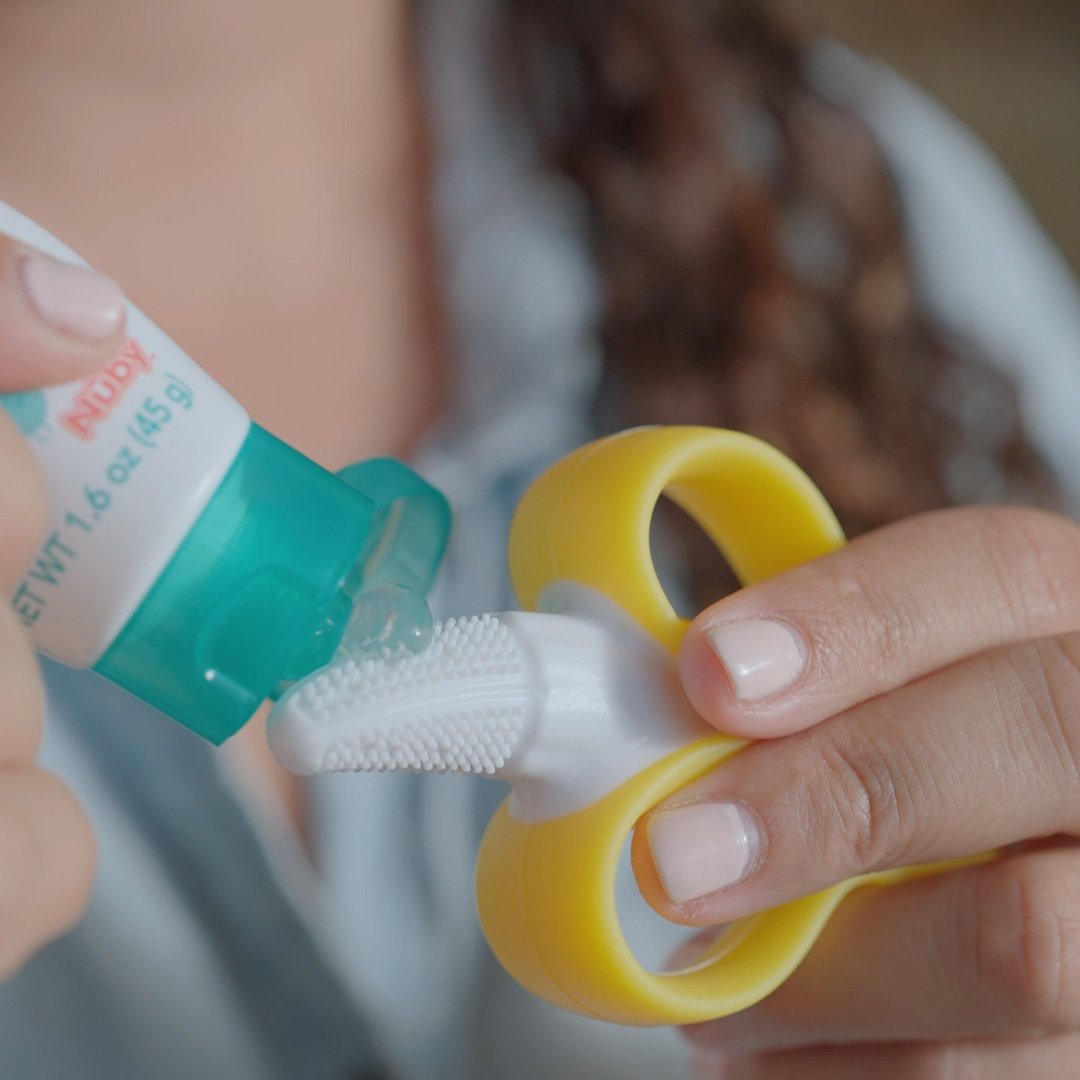Has your child's first pearly white tooth popped through? While you'll probably feel relieved that you get a small break from the dreaded teething phase (until the next one starts to come in), you now need to make sure you're looking after it properly.
Looking after your baby's teeth, no matter how small they are, will help prevent any bacteria or plaque buildup while teaching them good habits for brushing their own teeth later on. Keep reading to find out why it's important to brush milk teeth, how to brush them so young, and the best care tips for a healthy mouth.

Why Is It Important To Brush Milk Teeth?
Since brushing a baby's teeth and gums isn't the easiest thing, especially if they're teething, some parents might wonder why bother at all to brush milk teeth that permanent teeth will soon replace. Well, taking good care of their teeth now will not only establish healthy habits but prevent the risk of cavities too. Even milk teeth can decay and need cavities.
Milk teeth play an important role in preparing their mouth and gums for permanent teeth with the proper alignment and spacing. If your child's milk teeth become decayed and fall out, it can affect their speech development and nutrition and make their permanent ones come in crooked.
Baby And Toddler Toothbrushes
To start with, rather than using a toothbrush, you may find it easier to use a soft, clean cloth to gently brush their teeth and gums. Or you can use our NanaNubs Banana Massaging Toothbrush, which is made from 100% food-grade silicone and features soft massaging bristles that clean and soothe new teeth and tender gums.
As the first tooth can pop through from around four months old, at this age, you won't need to use toothpaste, only water. However, if you do want to use toothpaste, you should use a tiny amount of non-fluoride children's toothpaste, which won't be too harsh on their teeth.
When they get older, and more teeth start to appear, you can use a soft bristled toothbrush. Be aware, though, that babies tend to like to chew the head of a toothbrush, so it may need replacing every few months. Electric toothbrushes are only suitable when your child is three years old; until then, a manual toothbrush should only be used.

How To Brush Baby Teeth
Follow our tips below on how to brush your baby's teeth and how often.
Offer a helping hand whenever needed
Teeth brushing requires some pretty advanced motor skills, so your child won't be able to brush them themselves until they are around eight years old or have the dexterity to tie their shoelaces. When brushing the teeth, or tooth, of a young baby, it's best to sit them on your knee and rest their head against your chest for easy access to their mouths. For older children, stand behind them by the sink and tilt their heads backward so the toothbrush can reach toward the back of their mouth.
Brush their teeth twice a day
Ideally, you should brush your child's teeth twice daily: in the morning and just before bed. Each teeth brushing session should last at least two minutes for the most thorough clean. If your child is getting fidgety or struggles to have their teeth cleaned for that long, you can make it more fun by singing a song, telling a story, or using a timer and rewarding them afterward.
Use small, circular motions, covering all the surfaces
Did you know that teeth are harder and stronger than bone? Still, despite this, brushing their teeth quickly back and forth can damage and wear away the enamel. So, it's best to use small, circular motions to reduce the pressure. This also ensures that every surface is covered. Encourage your child to spit the toothpaste out afterward rather than swallowing it.
Make sure they don't lick or eat toothpaste from the tube
Toothpaste has a strong scent and flavor, and some children may be tempted to lick or eat the toothpaste from the tube. If they manage to swallow a relatively large dose of toothpaste, they may suffer from mild stomach discomfort. Make sure to always supervise your child while brushing their teeth and discourage them from ingesting any toothpaste.

Taking Your Baby To The Dentist
Many new parents don't realize that as soon as their child gets their first tooth, it can start to decay and become at risk for a cavity. It is recommended by the American Academy of Pediatrics that you bring your child in for a dental checkup when they get their first tooth. If no teeth have emerged by their first birthday, getting a checkup within the first year is still important to ensure everything is healthy.
Sugar And Tooth Decay
It's no secret that sugar is one of the leading causes of tooth decay. Things like popsicles and sugary sweet drinks can be particularly damaging as their teeth will be exposed to sugar for a longer time. However, natural sugars found in fruit are much less likely to cause tooth decay.
How To Cut Down Sugar In Your Child's Diet
To reduce the amount of sugar in your child's diet, follow these tips:
- Avoid sugar-sweetened and fizzy drinks. Plain milk and water are best.
- Check for sugar in pre-prepared baby food and choose sugar-free options if available.
- If you give your child fruit juice, dilute 1 part juice to 10 parts water.
- Don't give your child sweets or sugary snacks regularly; ask your family or friends to do the same.
- If your child needs medicine, ask your doctor or pharmacist for a sugar-free option.
Should I Give My Baby A Pacifier?
Giving your child a pacifier is perfectly acceptable and can offer your child comfort during the teething phase. Our Silicone Softees Pacifier is made of 100% food-grade silicone and features a textured handle that doubles as a teether. After 12 months, you should start to wean your child off the dummy as prolonged use may encourage an open bite or affect their speech development.
If you don't want to give your child a pacifier, we have a range of teething toys designed to soothe and comfort. Our collection also includes cooling teethers to help temporarily numb their mouths, which can be extremely useful to use just before brushing their teeth.



